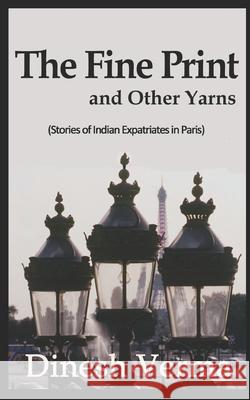The Fine Print and Other Yarns » książka
The Fine Print and Other Yarns
ISBN-13: 9781542795166 / Angielski / Miękka / 2017 / 280 str.
The Fine Print and other Yarns is a collection of nine stories some of which may well be classified as novella as they run into thirty to fifty pages. The first four are set in Paris of nineteen eighties and the next three in Paris of nineties. The last two are set in India around the turn of the last century. The collection is like a kaleidoscope, each turn of which presents an eminently interesting and unforgettable character. Among them are: * Buddy, a young lecturer in Delhi University in 1980s having a strange fascination for the bohemian life of painters in Paris but whose exposure to them is limited to what he has read in Moon and Sixpence and Lust for Life by Irving Stone. Buddy, who has been dreaming all his life of visiting Paris, gets a rare opportunity, though for just two days for what he thinks would be a rare opportunity to experience firsthand the life of painters and artists in Paris. However, what Buddy comes across in Paris of 1980s does not quite correspond to the image of life of Impressionist painters that he has been carrying in his mind and what follows is like an exorcism for him. * Krishnan, who has an ambition to become a marketing guru and who is doing his MBA from a reputed Business School in Paris, is invited for dinner to an elegant high-end restaurant in a chic quarter of Paris by a colleague on her birthday. The dinner in that posh restaurant proves to be a lesson in marketing skills for Krishnan, though one that he has to learn the hard way. * Dr Chopra, a widely traveled Indian doctor who considers himself to be the last word on foreign travel is on his first visit to the city of fashion and romance. Not knowing a word of French, the jet setting doctor finds himself driven to the point of utter hopelessness and despair finding his way to his hotel from the airport. Not able to carry out even basic communication with anyone, he feels like a child who has been separated from parents in a big fair and thinks of taking a flight back to Delhi the same day. Yet in two days he starts liking Paris so much that he is already planning his next trip there. * Pieter Van Der Polder, a Dutch young man who cooks his dinner with a finesse and attention to details that would remind one of a classical music performer, gets into a really interesting battle of wits with a Belgian girl on his floor. * Amitabh, a young man who is in Paris for a year with merely five hundred dollars that the foreign exchange rules allow him to carry out of India and a meager living allowance, finds his long standing reputation of being a generous and hospitable person getting evaporated into thin air. He undergoes such a transformation within a few days of his arrival in Paris that he would put to shame a confirmed miser. * A young mobile phone dealer in Delhi, who became multimillionaire almost overnight selling mobile phones, soon after the introduction of mobile telephony in Indian markets and then reduced to penury due to a sudden reversal of his fortunes, is once again on an upward trajectory in his business. Travelling from New Delhi to Chennai by train, he relates in a very brash and candid manner the tale of his shady business deals to his fellow passengers, not knowing that there is a dangerous person among his audience. * Bawa, a corporate executive in New Delhi buys a new Indian car in late 1980s, which is based on the technology of 1950s. Almost in love with his car he finds it getting transformed into virtually an antique after the influx of a host of new generation Japanese and German cars in the Indian market in early 1990s. Apart from the interesting characters and situations, these stories portray the lives of a cross section of Indians struggling to come to term with life in a foreign land that is very different from the one they had been used to. These stories provide a rare insight into the psyche of an average Indian and his resilience and adaptability, which are the hallmark of the Indian diaspora.
Zawartość książki może nie spełniać oczekiwań – reklamacje nie obejmują treści, która mogła nie być redakcyjnie ani merytorycznie opracowana.











